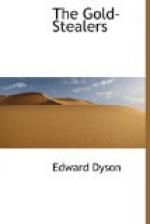For an hour or two each day Harry was fossicking in the creek on the spot where Frank had been working, with the idea of satisfying himself whether or not such gold as Frank had sold was obtainable there; and here the searcher’s daughter came upon him one morning shortly after the incident of the Sunday School. Harry had his cradle pitched near the crossing, and to ignore the young woman would be an avowal of enmity. Here was his opportunity. Harry set his face over the hopper and cradled industriously. He thought he was displaying proper firmness, but his hand trembled, his heart beat like a plunger, and he was the victim of an ignoble bashfulness. Chris approached with some timidity; but Maori bounded up to the young man, making elephantine overtures of friendliness, which were resented by Harry’s cattle-dog Cop, who walked round and round the mastiff in narrowing circles, bristling like a cat and snarling hoarsely. Maori treated the challenge with a lordly indulgence. Cop went further, he snapped and brought blood. There were some things Maori could not stand: this was one. Out of a small storm of pebbles, chips, leaves, and dust, the two dogs presently came into view again, Cop on his back, pawing wildly at the unresisting air, and Maori at his throat, pinning him with a vice-like grip.
Harry rushed to the rescue, tore his dog free, and held back the furious animal up-reared and exposing vicious fangs. Chris laid a trembling hand on the collar of the penitent Maori, and in this way the young people faced each other. Their eyes met for a moment, Harry’s frowning blackly, hers anxious and beseeching.
‘I’m sorry,’ she said. ‘Is he hurt?’
‘No,’ replied Harry sulkily. ‘No thanks to that brute of yours, though.’
‘Oh!’ This very reproachfully.
Harry looked up and encountered her eyes again, and they shattered him, as they had done in chapel, giving him a sense of having exerted his strength to hurt something sweet and tender as a flower; and yet the girl seemed to tower above him. Nature, in putting the fresh sympathetic soul of a child into the grand body of a Minerva, had set a problem that was too deep for Harry Hardy.
‘Beg pardon,’ he said, humbly; ’’twas my dog started it. Down, Cop! To heel—!’
He checked himself suddenly on a ‘stock term.’ There were tones of his master’s that Cop never dared to disobey; he went down at full length and lay panting, regarding Maori fixedly with a sidelong and malevolent eye. Harry returned to his cradle, and Chris approached the stepping-stones and paused there.
‘Did Dickie Haddon give you my message?’ she asked in a low voice.
Harry nodded.
‘It’s all right,’ he said.
There was another pause, broken at length by Chris.
‘You ought not to be angry with me. It isn’t fair.’
She was thinking of the day years ago when she was carried, all tattered and torn, from the midst of that mob of sportive cattle. She was a very little girl then, but the incident had remained fresh and vivid in her mind, and ever since Harry Hardy had been a hero in her eyes. He only remembered the affair casually and without interest.




